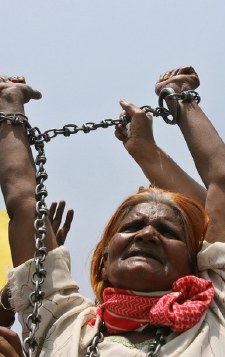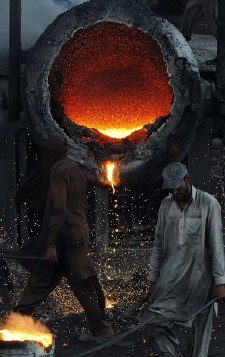Adil Najam
I write this post on May 1. Labor Day in most of the world.
We have written about workers and work, and about labor Day before. It is a good day to celebrate, because every day should be labor day. It is also good that the government made a big deal of this being Labor Day, that it used it to make high profile and visible political proclamations, and that it used it as an appropriate occasion on which to announce its new labor policy.
All of this is good. It is also good that the labor policy does focus on substantive provisions, including those for social insurance and old age benefits (even if on a voluntary basis). The center-piece of the new policy, and today’s big headline, is that the minimum wage has been increased for Rs. 6000 per month to Rs. 7000 per month.
Let us first establish one thing. The fact that the government has done this is good. It is clearly a step in the right direction. Well done.
Now, lets please take a moment to think about what this means.
What does it mean for someone – one assumes with a family, even if a small one – to live on Rs. 7000 per month? I do not think that this question, or its answer, needs any further elaboration from me. If you are on this site, called All Things Pakistan, you should be able to calculate an answer. And having done so, you should sit back in shock, and maybe even a little shame. I am doing that right now!
First, let me deal with the issue of shame. The fact of the situation is that nearly all government employees, even the most menial ones, get paid well above minimum wage. This is why there is line of constituents outside every MNA’s and MPA’s office wanting government jobs. Most government jobs, even low paying ones, actually have relatively decent benefits.
I know I will get flack for this, so let me be clear. I know very well that lots of government employees are paid abysmally. What we pay our teachers or policemen, for example, is a disgrace. And it is partly because of that disgrace that we get the further disgrace of increased corruption, incompetence, and professional uninterest. That is a serious and compelling problem. But a very different problem.
We are talking about those on “minimum wage” here. And the exposition of our own shame. Those who are at or near minimum wage are nearly entirely private employees, and a very large proportion of them are household employees and domestic help. Cooks, gardeners, sweepers, and other types of domestic help; in many cases children. Others are employed by small business, often under terms that are not just criminal, but inhuman – for example, workers in brick kilns.
Much as we are fond of blaming everything on governments, the shame in these cases is often our own. And the least we can do on May Day is to confront this shame, and acknowledge it.
Let me now come to the issue of shock. One of the earliest posts we did when ATP was first launched was on the (then) new Rs. 5000 banknote. It is a post that I still think a lot about. The point simply was that with the advent of the Rs. 5000 note, you could actually pay someone who would be considered as having a ‘good’ job (e.g., domestic help, even a driver at that time) his or her entire month’s salary in just one bank note. Here comes the shock – imagine that you work hard for a whole month, and at the end of it you are paid your entire salary for that month’s worth of work in just one banknote. Take a minute to think of what that would make you feel like! And what would make that feel about the worth of your work. And your own worth. Just think!
It is good that the minimum wage has been raised to Rs. 7000. But let us consider that this still means that someone can be paid for an entire month’s worth of work in two banknotes now – and then asked to return the “change”! Let us also consider that many Pakistanis will continue to work at less than this minimum wage. And also that nearly all of these Pakistanis will be paid this inhuman wage for their labor, not by anyone in the “government” but by other “ordinary” Pakistanis like ourselves.
And that is why I pause at reading the news and I sit back – in shock and in shame.
Tou qadir-e-mutlaq hai, magar tairay jahaN meiN
HaiN talkh bohat banda-e-mazdoor kay auqaat – Iqbal





















































I think this is a very important post. This is a highly complex matter. At the outset, let me just say that the shame issue is one that should haunt all of us as Pakistanis because a very large number of our people are not only paid abysmally but go without so many basics that it is simply awful!
However, having said that, I would say that while it is very important to have a minimum wage (and I support the concept), it is also extremely difficult to implement for some of the most obvious reasons–i.e., glaring unemployment! If there are so many unemployed people and someone is willing to give them a job for even 3000 rupees—they will take it because it is better than earning nothing. If they complain to the employer about minimum wage, he/she will tell them that if 3000 is not acceptable, they can easily get someone else who is currently unemployed so the reporting of such cases is not in the immediate interest of the victim. This issue incidentally also exists in the case of illegal immigrants in western developed countries—I could write pages about London’s underworld for instance where this issue plagues illegal immigrants.
I would also agree with Adil Najam that government employees may be relatively better off. Moreover, the urban/rural divide or even the big city/small city divide will be very stark here. This is another problem with having the same min wage across the board–the cost of living in Karachi is very different from the cost of living in Sialkot, for example, not to mention the difference in avenues for employment. And finally, about domestic workers—there are also huge disparities here—there are those people who literally pay their domestic workers nothing but food and clothing—often these domestic workers are either brought to the city from the village (and hence are beholden to the feudal employer) or are children beholden to the feudal/non-feudal employer. But then there are others, who are paying their domestic workers extremely well (relatively speaking)–for example, many drivers in Karachi are earning in the region 10-12000 rupees a month, getting a quarter to stay in (in the case of wealthy employers some of these quarters are hooked up to generators so their fans run during load shedding), sometimes cable connections to tv are provided not to mention interest-free credit lines for older employees, as well as an understanding that health care bills will be footed. In these instance, the domestic worker is far better off than the office peon for example—who may be just about making min wage but has none of the other benefits. I recall when I was working as a lawyer in Pakistan—our peons used to come and shower at work because they had no running water at home. Our driver and cook at home had no such issue. So although domestic workers are the first people we often think of when we examine our collective guilt, in essence, by virtue of being live-in, they may just be better off than a lot of others. I am by no means suggesting there isn’t room for much improvement—there absolutely is—but the issue needs to be examined in a comprehensive context and we should aim to come up with rules that can definitely be implemented across the board so that having these rules actually makes a difference.
Of course union employees are the best off—where unions exist—they make sure they take care of their workers.
One can feel from the comments that this is an uncomfortable conversation for people to have. Because iss hamam mein mum sabb nangay hain!
Those that are saying that 7,000 PKR is enough should be ashamed of themselves. Even if the govt makes it 10,000 what will be the real impact? The thing lies in implementation. A major chunk of domestic workers don’t make even half of minimum wage and work 12 hours a day. There needs to be something done about it. Kiln workers do not make a penny as they are bonded laborers. What a shame!
How are workers treated in homes varies. There is no sytem that uniformly enforces better treatment of workers or mesure worker’s performance of their resposibilities. there are many applaing stories of workers being ill trated at the same time there are numerous examples where well to do families treat their employess and employess’ families with care. In later cases great benevolance is demonstated
I don’t think this minimum wage applies to domestic workers. only to govt workers.
Also, domestic workers actually get good treatment and benefits so only looking at salary is wrong.